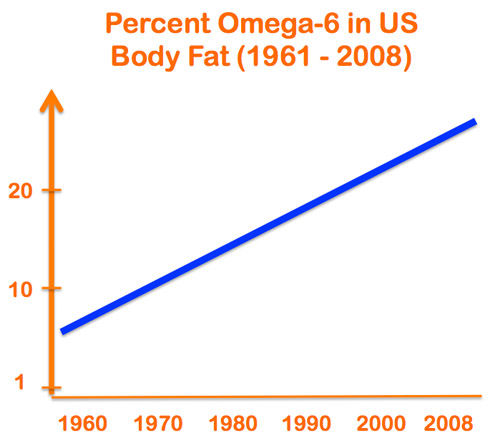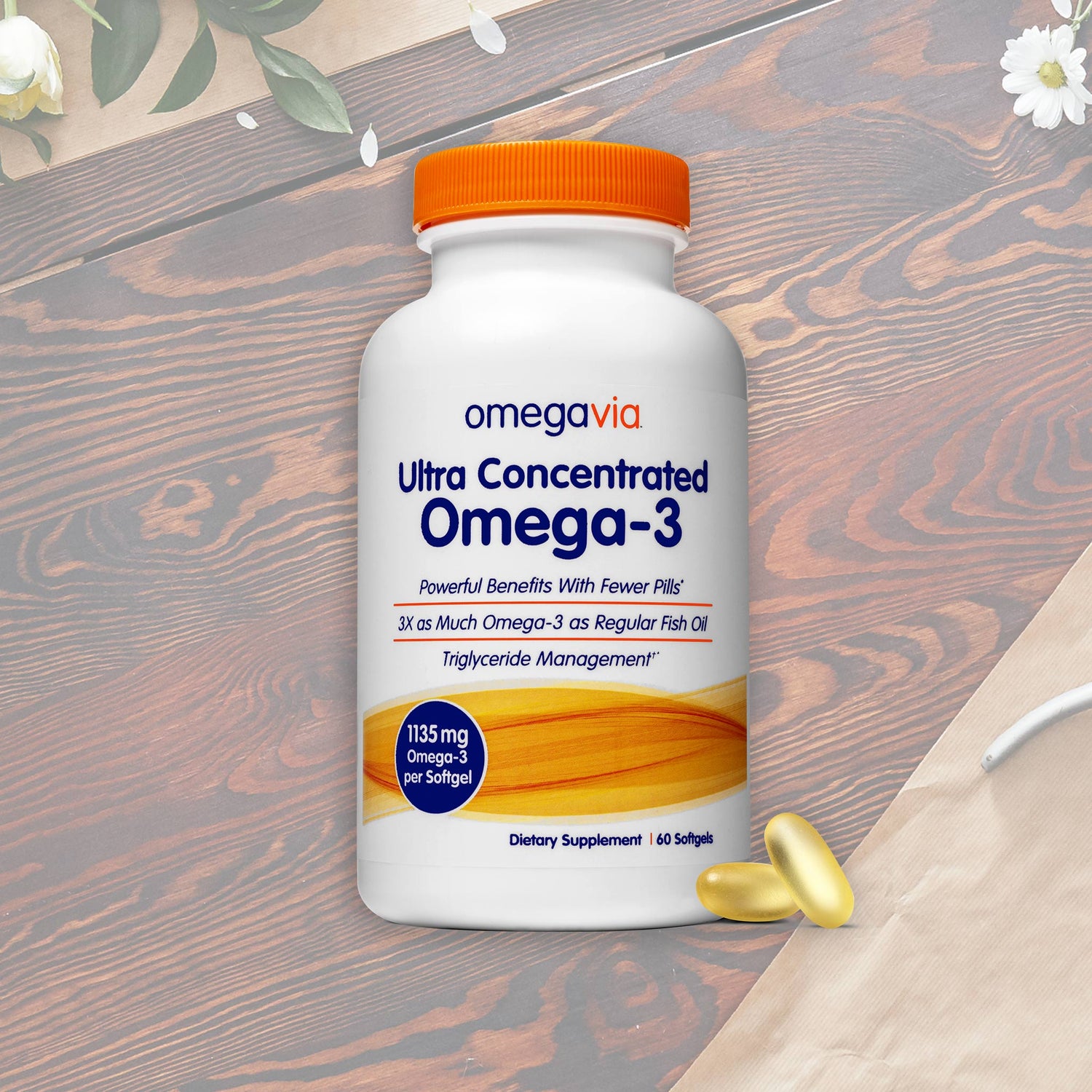Oxidized LDL is a much better predictor of 'cardiovascular events' than anything on your regular cholesterol panel.
Tests for oxidized LDL are not easily available, but there are some things you can do to shift the odds in your favor.
Factors that affect LDL oxidation
1. The type of fats found in your LDL cell membranes
As we discussed in the
last blog, the types of fat you eat determine how delicate your LDL cell membranes are. If you eat a lot of easily-oxidized Omega-3s and Omega-6s, you will have more LDL oxidation.*
Percentage of 'delicate' Polyunsaturated Fats in Common Cooking Fats and Oils
[caption id="attachment_10228" align="alignleft" width="576"]

Percentage of delicate fatty acids in oils. This combines both Omega-6 and Omega-3 fats. Source: USDA Nutrition Database.[/caption]
Eat fish a few times a week or take fish oil supplements when you can't eat seafood.
The key point that I want you to notice in the chart above is that the oils you were told are 'healthy' (because they lower cholesterol) are the ones most likely to oxidize your LDL.
Duck fat and avocado oil are my unofficial cut off points. I avoid everything above it. This is the #1 reason why I avoid eating out. If I must, I order a salad with olive oil on the side.
Sit down and clutch your pearls, Agnes!
I cook generously with beef tallow, butter and coconut oil. I mail order
beef tallow rendered from grass-fed cattle, my absolute favorite.
I do not fear saturated fats but you are welcome to. That they are harmful is, uh, a '
faith-based initiative' and has been proven false over and over.
Here.
Here.
Here.
Here.
Here.
Here.
Here.
Here.
Here. None of these references are light-weight blogs like this - they are published studies.
Your body is built to thrive on
normal levels of both Omega-3 and Omega-6. Your body is built to function despite
some levels of oxidation.
Not the 20-fold increase in oxidation burden we are subjecting our bodies to…and that dramatic increase in oxidation comes almost exclusively from Omega-6, linoleic acid, in the form of vegetable cooking oils.
[caption id="attachment_10372" align="alignleft" width="576"]

The level of pro-inflammatory and easily oxidized Omega-6 fat (Linoleic Acid) in subcutaneous body fat stores has increased 200% in the last half century. Adapted from:
Whole Health Source blog by Dr. Stephan Guyenet.[/caption]
As an aside, when three generations of mice were given a similar, increasing levels of Omega-6, each generation got
fatter, slower and
dumber. This could never apply to us. Of course. Never.
2. Toxins
Toxins (think cigarettes, alcohol, BPA in plastics, most things in the cleaning and cosmetics aisles), free radicals etc. will consume the built-in antioxidants in the LDL - CoQ10 and Vitamin E. Once the antioxidants are exhausted, the LDL is exposed and vulnerable to oxidation.
3. Antioxidants
Your liver bundles LDL with CoQ10 and
Vitamin E. Statin drugs for cholesterol reduction wipe out CoQ10 along with the cholesterol. And
90% of us don't get enough Vitamin E from foods. Together, this also increases vulnerability to LDL oxidation.
4. Duration of circulation
How long the LDL particle stays around in the body also determines LDL oxidation. The
longer it is in circulation, the more likely it is to get oxidized.
LDL particle density influences this.
Small, dense LDL particles (the bane of soda-guzzlin' insulin resistant folk) have
slightly higher 'hang time' in the body and are
more likely to get oxidized. Go Cola!
Stress, medications, gut dysbiosis, gluten, infections, and toxins can all make intestinal epithelial cells porous, hence the term 'leaky' gut. But gluten from
wheat is the champ.
With a leaky gut, partially digested food and bacteria from food waste enter your blood stream.
Bacterial cell wall components also oxidize LDL and are taken up by white blood cells and turn into foam cells which turns into plaque in your arteries.*
6. Nutrient deficiencies
Not enough Zinc and copper will make it hard for your body to make
enzymes that remove oxidizing substances from your body. When that happens, again, LDL gets oxidized. (Eat liver, nuts, shellfish, sesame seeds, oysters and beef.)*
How much sugar, carbs and grains (yes, even 'healthy' whole grains) you eat affects LDL oxidation. Sugar binds to LDL and speeds up oxidation.
Low thyroid levels
reduce LDL receptor activity, which causes LDL to remain in circulation and allows greater exposure to oxidants. Low thyroid due to diet-induced autoimmune hypothyroidism (see #5,
Hashimoto's), iodine deficiency,
goitrogen activity from excessive soy, millet, raw cruciferous vegetables, pollution etc.*
Notice that most of the factors listed above are diet-related. Pills can't help you here.
Not surprisingly, Big Pharma and medical establishment react with a yawn and
continue to pump us full of statins.
But, oh, never mind that...
Turns out eggs and butter were only deadly during the Reagan and Clinton eras.
I could go on...this statin horse is far from dead.
There are no Rx drugs to reduce oxLDL
When diet is the best prevention tool for any illness, you won't hear much about it. Because apparently you don't want to. Can't blame big pharma for everything. Sometimes you gotta look in the mirror.
Still, your great-grandmother probably didn't have a terrible oxLDL problem. But
you do. See graph above.
Our bodies are meant to operate quite nicely on fats found in olive oil, butter and yes, even lard and tallow. Human breast milk is rich in cholesterol and saturated fat - almost two third of the calories of breast milk comes from saturated fats.
Lard vs Olive Oil
Would you believe me if I told you that do-no-wrong olive oil is very similar to kill-you-dead lard? They both are mostly
oleic acid. Yup - the #1 fatty acid in both lard and olive oil are the same. Years of brain-washing from the media might make you avoid lard, tallow or butter, but they all contain fats that don't oxidize easily. Go ahead, ask a teenager if he/she even knows what tallow is.
In my house, people get in trouble for throwing away bacon fat. Kids eat fruits, eggs and bacon for breakfast. And daddy gets to make scrambled eggs in bacon fat. Yum.
Either way, you won't see a bottle of Canola within a mile of my kitchen.
What now? More lard and less Lipitor?
Them're fightin' words to many of you out there. I'm just pointing out evidence that made me scratch my head (and alter my diet.)
But what you do is up to you and your doctor. Don't wing it! I see three different integrative/functional MDs.
Based on what causes increased oxLDL production, it seems to me (and my doctors) that reducing Omega-6-rich vegetable oils and replacing them with low-Omega-6 fats makes sense. Along with making sure you're not taking anything to nuke your CoQ10 levels.
Cutting out wheat and sugar seems prudent regardless.
*These statements have not been evaluated by the Food and Drug Administration. This product is not intended to diagnose, treat, cure, or prevent any disease.
 Percentage of delicate fatty acids in oils. This combines both Omega-6 and Omega-3 fats. Source: USDA Nutrition Database.[/caption]
Eat fish a few times a week or take fish oil supplements when you can't eat seafood. The key point that I want you to notice in the chart above is that the oils you were told are 'healthy' (because they lower cholesterol) are the ones most likely to oxidize your LDL.
Duck fat and avocado oil are my unofficial cut off points. I avoid everything above it. This is the #1 reason why I avoid eating out. If I must, I order a salad with olive oil on the side.
Sit down and clutch your pearls, Agnes!
I cook generously with beef tallow, butter and coconut oil. I mail order beef tallow rendered from grass-fed cattle, my absolute favorite.
I do not fear saturated fats but you are welcome to. That they are harmful is, uh, a 'faith-based initiative' and has been proven false over and over. Here. Here. Here. Here. Here. Here. Here. Here. Here. None of these references are light-weight blogs like this - they are published studies.
Your body is built to thrive on normal levels of both Omega-3 and Omega-6. Your body is built to function despite some levels of oxidation. Not the 20-fold increase in oxidation burden we are subjecting our bodies to…and that dramatic increase in oxidation comes almost exclusively from Omega-6, linoleic acid, in the form of vegetable cooking oils.
[caption id="attachment_10372" align="alignleft" width="576"]
Percentage of delicate fatty acids in oils. This combines both Omega-6 and Omega-3 fats. Source: USDA Nutrition Database.[/caption]
Eat fish a few times a week or take fish oil supplements when you can't eat seafood. The key point that I want you to notice in the chart above is that the oils you were told are 'healthy' (because they lower cholesterol) are the ones most likely to oxidize your LDL.
Duck fat and avocado oil are my unofficial cut off points. I avoid everything above it. This is the #1 reason why I avoid eating out. If I must, I order a salad with olive oil on the side.
Sit down and clutch your pearls, Agnes!
I cook generously with beef tallow, butter and coconut oil. I mail order beef tallow rendered from grass-fed cattle, my absolute favorite.
I do not fear saturated fats but you are welcome to. That they are harmful is, uh, a 'faith-based initiative' and has been proven false over and over. Here. Here. Here. Here. Here. Here. Here. Here. Here. None of these references are light-weight blogs like this - they are published studies.
Your body is built to thrive on normal levels of both Omega-3 and Omega-6. Your body is built to function despite some levels of oxidation. Not the 20-fold increase in oxidation burden we are subjecting our bodies to…and that dramatic increase in oxidation comes almost exclusively from Omega-6, linoleic acid, in the form of vegetable cooking oils.
[caption id="attachment_10372" align="alignleft" width="576"] The level of pro-inflammatory and easily oxidized Omega-6 fat (Linoleic Acid) in subcutaneous body fat stores has increased 200% in the last half century. Adapted from: Whole Health Source blog by Dr. Stephan Guyenet.[/caption]
As an aside, when three generations of mice were given a similar, increasing levels of Omega-6, each generation got fatter, slower and dumber. This could never apply to us. Of course. Never.
The level of pro-inflammatory and easily oxidized Omega-6 fat (Linoleic Acid) in subcutaneous body fat stores has increased 200% in the last half century. Adapted from: Whole Health Source blog by Dr. Stephan Guyenet.[/caption]
As an aside, when three generations of mice were given a similar, increasing levels of Omega-6, each generation got fatter, slower and dumber. This could never apply to us. Of course. Never.



